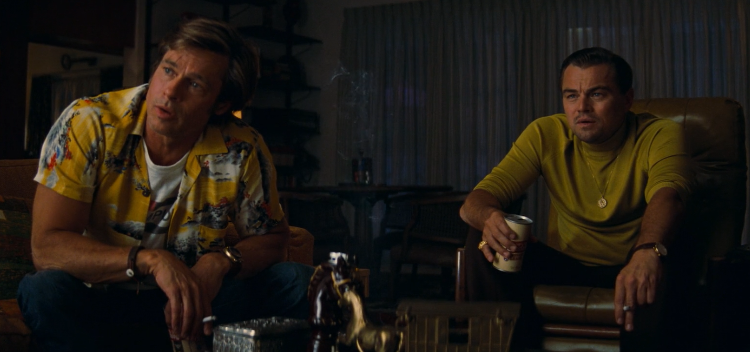I remember the first time I saw Pulp Fiction quite well. I was a sixteen-year old already settled on my path to becoming a proper nerd, which means I was your regular outsider in a valley of farmers and carpenters, far from any big city, and without a reliable internet connection. I relied on magazines to inform my cinephilia, and at that time some of those came with a VHS attached. That is how Pulp Fiction entered my life.

Fast forward fifteen years, and after Inglourious Basterds I lost interest in Quentin Tarantino. I didn’t particularly like Django Unchained and though I enjoyed The Hateful Eight, I’ve never gone back to it. The only one of his works I was willing to revisit is Death Proof, because there our love for images met, danced, and kissed amiably.
This could partly explain why Once Upon a Time in Hollywood hit me so hard. I simply wasn’t expecting a great film from Tarantino, and I certainly wasn’t expecting him to be able to tell me something new. I’ve always had the feeling he had little to say, albeit he had been saying it mostly convincingly, film after film. The themes, the references, the dialogues, the violence, the objectification of pop culture: his cinema has been a reiteration of his own obsessions. An enjoyable endeavour if you go along with it, a trite exercise when you don’t.
In Once Upon a Time in Hollywood, Tarantino has finally understood that geeky quotes, fan-service, and homages can live within a much broader context. Instead of amusing the audience and himself with pop references and obscure trivia, he uses nostalgia as a platform to deliver punches at a world that is actually not the dream we used to believe in. And so we have an ageing actor who is forced to accept subpar roles, merely a pawn at the disposal of producers and directors who just want to profit from his once glorious fame. Next to him a stuntman who, in spite of his easygoing attitude, sees his future perilously attached to a movie star’s highs and lows. All dark sides of an industry that swallows you in as quickly as it can throw you out from the back.
However, Tarantino is too much in love with his idea of Hollywood to let go nostalgia once and for all. Once Upon a Time in Hollywood brims with the culture of the period, every set carefully devised to convey the feeling of a long gone era. The joy of re-creation is evident: leaflets, signposts, accessories, wallpapers, posters, everything mirrors an insane love for those years. In his previous films, this would be a sign of attention to minute details for the sake of it, a perversion for popular paraphernalia one has to show off, but here Tarantino finds the grace of George Lucas’ American Graffiti. The camera moves patiently from a billboard to a neon sign, caresses a drive-in and indulges on a cocktail with lover’s eyes. The surroundings blend in with the individual stories being told. Instead of keeping track of the pop nods, the viewer can actually feel in another place and another time, and they are forgiven when they miss the umpteenth clue.
Key to this smooth balance between time-travelling fun and functional environments is what lies beneath the surface. Tarantino’s cinema is one of individuals, men and women who more or less coincidentally cross paths which usually end in violent confrontations. Here we have long stretches where nothing relevant seems to happen. Just when one is about to ask whether there is a point or not, one realizes the isolation the characters live in and how much of everyone’s distinct isolations Tarantino intersects at precise points of the story. The pleasure Sharon Tate finds in the people appreciating her performance on the screen of a movie theatre is the pleasure Rick Dalton discovers in being able to act greatly in a hackneyed western. The nonsensical world Cliff Booth flashbacks into while on Dalton’s rooftop gives him the same happiness Sharon Tate dwells in when home alone she listens to her favourite music. For a director so in love with his dialogues, there are plenty of beautifully silent moments in Once Upon a Time in Hollywood.
Moreover, this film marks the first time in almost thirty years Tarantino has replaced irony and complacent jokes with self-irony. I remember vividly when, at the peak of his popularity, he ended up on the covers of DVDs recommending the latest Asian film director he put his eyes on. His words become religion among film viewers, and I too started digging through B-movies shelves to discover the hidden gem he had just mentioned in another interview. In Once Upon a Time in Hollywood Tarantino has eventually come to terms with this, lightly mocking the pretentiousness of all but forgettable productions. He invests so much time in making the less than memorable stints of Rick Dalton look real that one may believe he really thinks they are great stuff. Thanks to DiCaprio’s hilarious overacting, though, the mimicry is exposed as brilliantly as it is achieved.
Once Upon a Time in Hollywood could very well be the surprise of the year for me. I hope Quentin Tarantino moves further from here, and begins to apply the lenses he used to analyse the world of the Hollywood that was to the Hollywood that we have right now.